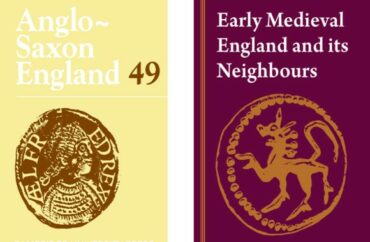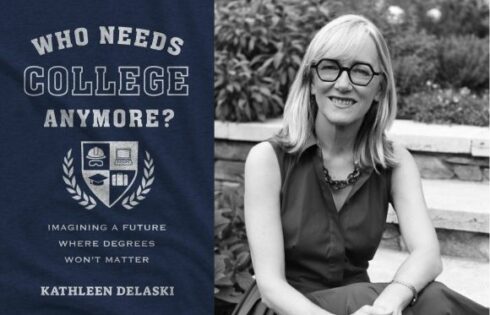
Scholar: Revisionist trend views ‘Western culture’ as ‘white supremacist, patriarchal’
Cambridge University Press changed the name of its journal Anglo-Saxon England this spring, but two scholars said the change sends the wrong message.
The publisher said the new name, Early Medieval England and its Neighbors, is part of a series of changes being instituted at the 50-year-old journal.
“The new title reflects the breadth of that scholarly work, and is one part of a broader relaunch of the journal, which is now Open Access, will have more regular publications, and take on an expanded scope,” Cambridge University Press said in a recent statement provided to The College Fix via email.
The goal is “to solidify the journal’s position as the foremost in this rich field,” the publisher said.
The British university publisher also said the term still will be allowed in articles.
“We have not banned the use of the term ‘Anglo-Saxon’, nor are we discouraging its use,” it said. “The journal will continue to welcome and use the term ‘Anglo-Saxon’ as it publishes a broad range of high-quality scholarly research on England, its closest geographic and intellectual neighbors, and their wider cultural contacts from the 5th to the 11th century.”
But Mises Institute research scholar Wanjiru Njoya told The Fix she believes the name change is a part of a “decolonizing” trend in higher education. The Alabama institute advocates for individual freedom and American foundational values.
“Cambridge has been leading the charge to drop the name ‘Anglo-Saxon’ as part of a wider ‘decolonize the curriculum’ movement, but Cambridge is not alone,” Njoya said in a recent email.
“All universities in the UK and across the West are decolonizing the curriculum,” she told The Fix. “This movement began in America some years ago and spread out from there. As you may know, it’s not just medieval history or the classics affected, but all fields of study including the natural sciences.”
Njoya said dropping historical terms is part of revisionist history.
“Changing the name of the Anglo-Saxon journal is one example of how the ‘decolonize’ movement attacks what they call the hegemony of ‘dead white males.’ The ‘decolonizers’ consider Western culture to be white supremacist and patriarchal,” she said.
“They oppose Anglo-Saxon history on grounds that this history seems to depict white males in a glorifying light, which they fear is a ‘white supremacist dog whistle’ for racists,” she told The Fix. “The ‘decolonizers’ want all fields of study to reflect diverse races and genders, and to this end they argue that Western culture must be downgraded. Dropping the term ‘Anglo-Saxon’ should be seen in that wider context.”
Njoya also commented on the controversy in a May 8 post on X.
Now Cambridge has changed the name of their journal from “Anglo-Saxon” to “Early Medieval”
“Cambridge is teaching students that Anglo-Saxons did not exist as a distinct ethnic group as part of efforts to undermine “myths of nationalism”.”https://t.co/cB1iKZs2tE
— Wanjiru Njoya (@WanjiruNjoya) May 9, 2024
However, the university publisher defended its decision in a May 10 blog post, stating the journal is undergoing a number of changes, including expanding its editorial team and redefining its scope.
“It is not uncommon for journal titles to change in order to highlight a relaunch, reflect developments in scope, or mirror the terminology used by the people who read and write for them…” the post states. “The new title, Early Medieval England and its Neighbours (EMEN), aims to express a scope that incorporates, but extends beyond, ‘Anglo-Saxon England.’”
Although the journal is not banning the term, the publisher stated there are more inclusive terms that could be used for the inhabitants of early medieval England.
“‘Anglo-Saxon’ is an established and often valuable short-hand for a set of people groups who populated the region we now call England during the period, but it is not the only one; does not describe the full breadth of the island’s people, politics and influence during the 5th-11th centuries; and is not used consistently by all scholars,” according to the blog.
Another British intellectual also expressed concerns about the motivations for the name change.
Historian and author Dominic Sandbrook said the decision reflected negative connotations of the term Anglo-Saxon common in the United States.
Sandbrook said the press “didn’t have the courage to say no to a handful of mad Americans” in a statement to The Telegraph in May.
Meanwhile, the University of Cambridge, which houses the publisher, still uses the term in its Department of Anglo-Saxon, Norse and Celtic.
Debby Banham, an affiliated lecturer and expert in Anglo-Saxon history and paleography in the department, told The Fix in a recent email that news reports about the journal’s name change wrongly “conflate the university with the press.”
Neither she nor other department faculty responded to The Fix’s questions asking for their opinions about the journal’s decision and if the university has removed or discontinued the term Anglo-Saxon in any other areas.
MORE: Princeton professor argues America is irredeemably racist, must be refounded
IMAGE: Cambridge University Press
Like The College Fix on Facebook / Follow us on Twitter






Please join the conversation about our stories on Facebook, Twitter, Instagram, Reddit, MeWe, Rumble, Gab, Minds and Gettr.